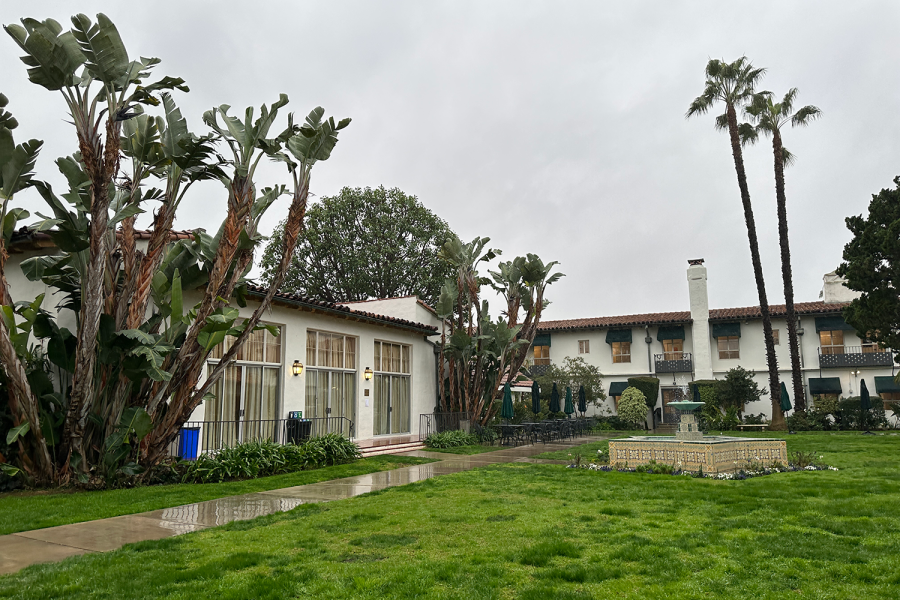Heavy rain, storms impact Archer community, California, demonstrate greater climate trend
Photo credit: Audrey Chang
The courtyard is empty during a rainy day Monday, Jan. 9. During rainy days, students looked for indoor spaces to eat, sit and study.
January 15, 2023
In the first two weeks of 2023, people across California and in Los Angeles have seen a lot of something they are not used to: the rain.
The past three years have been the driest ever recorded in California according to drought.gov, so heavy rainfall may seem like a positive weather change. However, according to CNN, the impacts of the drought, in addition to California wildfires, have made the land unable to soak up significant amounts of this rainfall, increasing vulnerability to flooding.
The recent severe weather is part of continuous atmospheric rivers hitting the West Coast, which are long, narrow regions in the atmosphere that can move moisture thousands of miles. They cause California’s heaviest rains and contribute to the most extensive floods, and just one atmospheric river can flood homes, down power lines and cause debris flow.
A new storm is expected to hit the Los Angeles area Monday, Jan. 16, and bring another inch or more of rain. Extensive rainfall in parts of central California have caused flooding, mudslides, debris flow and closed highways.
Although Los Angeles has not been experiencing the greatest extremes of the weather, the area has still be impacted, including widespread street flooding and trapping some people in cars, according to an L.A. Times article. Some schools in the Los Angeles area shifted to remote learning or sent schools to alternative sites due to flooding roadways Tuesday, Jan. 10, including Malibu schools closing that day and having classes online.
Dean of Student Life, Equity and Inclusion Samantha Hazell-O’Brien has been helping manage across-the-street privileges, transportation and providing indoor spaces for students and classes amidst weather challenges and safety concerns.
“We’ve been in contact with Tumbleweed, which is our bus company, to make sure that safety is definitely at the top of the list — that bus routes, anyone who’s delayed, they communicate directly with the school so we can let the teachers know. Parents are also informed buses are delayed. We’ve been really lucky that we haven’t had large issues with transportation,” Hazell-O’Brien said. “Compared to last year, [the adjustments] are the same, but I don’t remember this much rain back to back, so it’s definitely having an impact.”
The intense weather has caused power outages across the state, and Associate Head of School for Finance and Operations Jane Davis said that Archer has been lucky to not experience any power outages or major problems with the building due to the heavy rain.
“It’s been challenging at lunch. People have been tucked into little areas and corners of the building where people would normally be outside, so that’s from the social perspective,” Davis said. “We are incredibly lucky that we’re not in an area that is prone to flooding … We’re also lucky that we haven’t had any power outages or any major problems with the building because of the volume and the amount of the rain.”
According to a New York Times article, due to the burning of fossil fuels that results in climate change, storms are more likely to be extremely wet and more intense since the warmer air can hold more moisture. Scientists are still studying if and how global warming affects the number and length of atmospheric rivers in California.
Science teacher and Sustainability, Environmental and Outdoor Education Specialist Casey Huff said that the sudden and extreme amount of rain Los Angeles has been experiencing is a result of new weather patterns resulting from climate change.
“Everybody, I think, has the idea that, because we’ve been in a drought — a very significant drought — that getting rain is good, but the amount that we’ve been getting in the short window as a result of climate change is also catastrophic in its own way,” Huff said. “The reality of climate change is that we’re seeing new weather patterns; we’re seeing days and events that we can normally count on in ‘normal’ years no longer.”
Archer’s garden has been a positive sustainable development, but the gardening program has paused due to the heavy rain. According to Huff, Archer is on the energy grid that uses a mixture of fossil fuels and solar power, and she hopes to continue moving Archer in the direction of more sustainable energy and continue expanding sustainable practices in the future to help address the pressing issue of climate change.
“Thinking about things like rainwater capture would be really, really important. The garden is a really great thing because it’s a good use of when it does rain, obviously then that means we don’t have to water when we’re in a drought, but I am curious to see how much water has impacted our garden beds and our soil and all of that,” Huff said. “The role that I have and then being on the Emergency Management Committee is thinking about our energy use long term and how we can have some greener energy use.”










